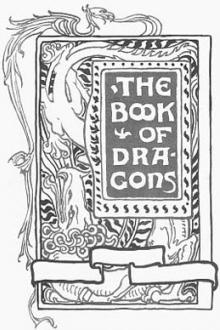The Dragon And The Raven: Or The Days Of King Alfred(Fiscle Part-3), G. A. Henty [top business books of all time .txt] 📗

- Author: G. A. Henty
Book online «The Dragon And The Raven: Or The Days Of King Alfred(Fiscle Part-3), G. A. Henty [top business books of all time .txt] 📗». Author G. A. Henty
Number Of Danish Galleys, Most Of Which Were Laden With
Rich Booty. Then She Returned To Rome. A Few Days Later A
Solemn Service Was Held, At Which Freda And Siegbert Were
Baptized As Christians, And After This Was Done A Marriage
Service Was Held, And Edmund And Freda Married With The
Rites Of The Christian Church. The Pope Himself Was Present
At The Services And Bestowed His Blessing Upon The Newly
Married Couple, The Novelty Of The Occasion Drawing A Vast
Crowd Of Spectators.
A Few Days Later The Dragon Again Put To Sea, And After A
Speedy Voyage With Favourable Weather Arrived In England
Without Further Adventure. Edmund's Arrival At Home Was
The Occasion Of Great Rejoicings. The News Of The Share Which
The Dragon And Her Crew Had Taken In The Defence Of Paris
Had Reached England, But None Knew What Had Become Of
Her From That Time, And When Months Had Passed Without
Tidings Of Her Being Received It Was Generally Supposed That
She Must Have Been Lost.
Her Return Laden With Rich Booty Excited The Greatest
Enthusiasm, And The King Himself Journeyed To Sherborne To
Welcome Edmund On His Arrival There.
"So This Is The Reason," He Said Smiling, When Edmund
Presented Freda To Him, "Why You Were Ever So Insensible To
The Attractions To Our Saxon Maidens! Truly The Reason Is A
Fair One And Fully Excuses You, And Right Glad Am I To Welcome
Your Bonnie Bride To Our Shores."
Alfred Remained Three Days At Sherborne And Then Left
Edmund To Administer The Affairs Of His Earldom, For Which A
Substitute Had Been Provided In His Absence. The Large Plunder
Which The Dragon Had Brought Home Had Enriched All
Who Had Sailed In Her, And Greatly Added To The Prosperity
Which Prevailed In Edmund's District.
He Found That In His Absence Alfred Had Introduced Many
Changes. The Administration Of Justice Was No Longer In The
Hands Of The Ealdormen, Judges Having Been Appointed Who
Journeyed Through The Land And Administered Justice.
Edmund Highly Approved Of The Change, For Although In Most
Cases The Ealdormen Had Acted To The Best Of Their Powers
They Had A Great Deal Of Other Business To Do; Besides, Their
Decisions Necessarily Aggrieved One Party Or The Other And
Sometimes Caused Feuds And Bad Feelings, And Were Always
Liable To Be Suspected Of Being Tinged With Partiality; Whereas
The Judges Being Strangers In The District Would Give Their
Decisions Without Bias Or Favour.
Freda Had, As Was The Custom, Taken A New Name In Baptism,
But At Edmund's Request Her Name Had Only Been
Changed To The Christian One Of Elfrida, And Edmund To The
End Of His Life Continued To Call Her By Her Old Name. She
Part 3 Chapter 19 (United) Pg 179Speedily Became As Popular In The Earldom As Was Her Husband.
Siegbert, Who Had Been Christened Harold, Took Kindly
To His New Life. Between Him And Egbert A Great Friendship
Had Sprung Up, And Edmund Built For Their Joint Use A House
Close To His Own.
In 884 Alfred Heard That The Danes Of East Anglia Were
In Correspondence With Their Countrymen At Home And In
France, And That There Was Danger That The Peace Of England
Would Be Disturbed. The Thanes Were Therefore Bidden To
Prepare For Another Struggle, To Gather Sufficient Arms In
Readiness For All The Able-Bodied Men In Their District, And To
Call Out Their Contingents From Time To Time To Practise In The
Use Of Arms.
The Ealdormen Whose Seats Of Government Bordered
On The Sea Were Ordered To Construct Ships Of War, So That Any
Danish Armament Might Be Met At Sea. Edmund Was Appointed
To Command This Fleet, And Was Instructed To Visit
The Various Ports To Superintend The Construction Of The Ships,
And When They Were Completed To Exercise Their Crews In Naval
Maneuvers.
The Winter Of 884 Was Spent By Edmund In The Performance
Of These Duties. The Dragon Was Again Fitted Out, And
In Her He Cruised From Port To Port. Freda, Who Was
Passionately Fond Of The Sea, Accompanied Him, As Did Siegbert
And Egbert. It Was Not Until May In 885 That The Threatened
Invasion Took Place. Then The News Came To The King That The
Danes Had Landed In Large Numbers Near Rochester And Had
Laid Siege To The Town. The King Instantly Summoned His Fighting
Array, And In A Few Days Moved At The Head Of A Large
Army Towards Kent. Rochester Was Defending Itself Valiantly.
The Danes Erected A Great Tower Opposite To The Principal
Gate, And Overwhelming The Defenders On The Walls With Their
Missiles Endeavoured To Force Their Way In By Battering Down
The Gate.
The Inhabitants, However, Piled Great Masses Of Stone
Behind It, And Even When The Gate Was Battered In The Danes,
With All Their Efforts, Were Unable To Force An Entrance. The
Saxon Army Advanced With Such Celerity That The Danes Had
Received No News Of Their Coming Until They Were Close At
Hand. Then One Of Their Foraging Parties Arrived With The
Intelligence That A Great Saxon Army Was Upon Them. The
Danes Were Seized With A Sudden Panic, And Fled Precipitately
To Their Ships, Leaving Behind Them The Horses They Had
Brought From France, Their Stores, And All The Prisoners And
Spoil They Had Gathered In Their Incursions In The
Neighbourhood Of Rochester. Seeing How Well The Saxons
Were Prepared For Resistance The Greater Portion Of The Danes
Crossed To France, But Sixteen Of Their Vessels Entered The
Stour And Joined Their Allies Of East Anglia.
Part 3 Chapter 19 (United) Pg 180
Alfred Ordered His Fleet To Assemble In The Medway, And
In A Fortnight The Vessels From All The Southern Ports Arrived.
They Were Filled With Fighting Men, And Sailed To Attack The
Danes In The Stour, After Which The Force Was To Land And To
Inflict A Severe Punishment Upon East Anglia. On Hearing
Of The Gathering Of The Saxon Fleet Athelstan Sent Across To
France And Begged The Danes To Come To His Assistance, But
None Of Their Vessels Had Arrived When The Saxon Fleet Reached
The Mouth Of The Stour.
The Fighting Force On Board The Danish Ships Had Been
Largely Reinforced By Their Countrymen Of East Anglia, And In
A Close Body They Rowed Out To Give Battle To The Saxons. A
Desperate Fight Ensued, But After A Struggle, Which Continued
For Many Hours, The Danes Were Completely Defeated, The
Whole Of Their Vessels Were Captured, And All On Board Put To
The Sword.
On The Following Day The Army Landed And Ravaged The
Surrounding Country And Returned To The Ships With Much
Booty. As They Sailed Out Of The River They Saw A Vast Fleet Of
The Enemy Approaching. Athelstan Had Assembled His Ships
From All The Ports Of East Anglia, And Had Been Joined By A
Large Reinforcement Of His Countrymen From France. The
Saxons Were Greatly Outnumbered, But A Portion Of The Fleet
Fought With Great Bravery. Some Of The Ships, However, Being
Manned With Newly-Collected Crews Unaccustomed To Naval
War, Lost Heart, And Made But A Poor Resistance.
Alfred Was On Board The Dragon, Which Sank Several Of
The Danish Galleys, And With Some Of Her Consorts Continued
The Fight Until Nightfall, Beating Off Every Attempt Of The Danes
To Board Them. Seeing That Several Of The Ships Had Been
Captured, That Others Had Taken To Flight, And That There Was
No Longer A Hope Of Victory, Alfred Gave The Signal, And The
Dragon And Her Remaining Consorts Fought Their Way Through
The Danish Fleet And Made Their Escape.
The Valour Which The Saxons Had Shown In These Two
Sea-Fights, And The Strength Of The Army With Which Alfred
Had So Speedily Marched To The Relief Of Rochester, Greatly
Impressed The Enemy, And Although Rollo Came Across From
Normandy To The Assistance Of Athelstan, The Danes Concluded
That It Was Better To Leave The Saxons To Themselves.
Alfred In The Following Spring Again Assembled His Army
And Laid Siege To London, Which Was Still In The Possession Of
The Danes. Athelstan Did Not Venture To March To Its Assistance,
And The Town, Which Had Long Been In The Northmen's
Hands, Was Captured. The Greater Portion Of The City Was
Burned In The Siege. Alfred Ordered It To Be Rebuilt, Invited
Its Former Inhabitants To Return, And Offered Privileges To All
Who Would Take Up Their Abode There. The Walls Were Rebuilt,
Part 3 Chapter 19 (United) Pg 181And The City Placed In A Position Of Defence. Alfred
Then Handed It Over To Ethelred, The Ealdorman Of Mercia.
Peace Was Now Made With Athelstan, And For Some Years
Remained Unbroken. In 893 A Danish Fleet Of 250 Ships Sailed
Across From Boulogne And Landed In The Weald Of Kent, Which
Was Then Covered With A Great Forest, And There Wintered, While
The Viking Hasting With Eighty Ships Sailed Up The Thames
And Built A Strong Fort At Milton.
Alfred Stationed His Army In A Strong Position Half-Way
Between The Forest And The Danish Camp At Milton, So That He
Could Attack Either Army When They Moved Out Of Their Stronghold.
The Danes For Many Months Remained In The Forest,
Issuing Out Occasionally To Plunder In The Open Country Of
Kent, Sussex, And Hampshire, But They Met With A Stout Resistance
From The Saxons Who Had Remained In The Towns And Country.
After Easter, Having Collected A Considerable Amount Of
Spoil, And Finding The Resistance Ever Increasing, The Danes
Moved Northwards From Their Forest, Intending To March Into
Essex. The King's Forces At Once Set Off To Intercept Them,
And Overtook Them At Farnham, Where The Northmen Were
Completely Defeated. All Their Booty Was Recaptured, With
Their Horses And Stores. Those Who Escaped Fled Across The
Thames And Took Refuge On An Island In The Colne. The
Saxons Besieged Them There; But When The Danes Were About
To Surrender From Want Of Provisions The News Arrived That
The Northmen Of Northumbria And East Anglia, With 240
Ships, Had Landed Suddenly In Devonshire, And Had Laid Siege
To Exeter.
The Siege Of The Island Was At Once Raised, And King
Alfred Marched Against The New Arrivals, And Advancing With
Great Speed Fell Upon Them And Defeated Them. Then Hastily
Returning He Came To London And, Joined By A Strong Force
From Mercia, Marched Against Milton, Where Hasting Had
Been Joined By The Great





Comments (0)